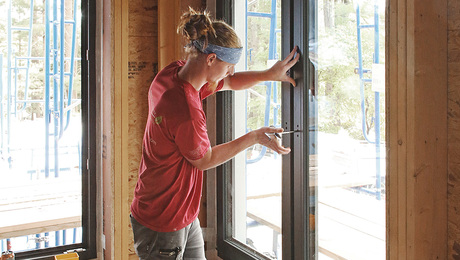We just had a gas dryer installed, and instead of hooking the gas dryer up to the gas feed with a flexible gas connector (like commonly seen with gas ranges) the plumber used black pipe.
This seems odd to me, as I would think we would want some flexibility in the positioning of the dryer, and also that the dryer might get banged around a bit since it sits next to a front loading washing machine (and those can “walk”).
According to the dryer installation instructions, it says that it should be hooked up to the gas line with a flexible hose rated for gas. But, it doesn’t say that you can’t hook it up with hard pipe.
Anyone know what’s code? You’d think the plumber would have done it this way for a reason (unless he just didn’t have a gas connector in his truck and was trying to save a trip to the store).















Replies
Don't know of any reason why you couldn't do it this way. But I can think of reasons you shouldn't. Makes it tough to pull the dryer out to pop the vent line and clean it out. Also, my dryer at least, gets moved around a bit if the washer goes out of balance and starts to tap dance across the floor. Not a good thing for rigid gas connections.
Mike Hennessy
Pittsburgh, PA
Where I live the codes have changed to limit the use of CSST and flex in long runs, but I don't know of any code that won't allow a short piece of flex between the main line and the appliance.
How the heck did he attach the last piece of black pipe? I've never seen a union fitting in that kind of pipe. Is there a drip leg? If not I'd call him back out and ask some questions.
This wouldn't be a long run. The gas line comes out of the wall about 40" high or so, then there's the shutoff valve, and then a 3' run or so to the dryer. I'm very surprised by the rigid pipe. That's not all that easy to do, so even the "no connector theory" seems surprising.
Okay, the plumber said the reason for the hard pipe is that a dryer moves too much. According to him, the dryer could move too much and cause the flexible connector to fail. A stove is moved infrequently and therefore the hookup wouldn't be strained.
Personally, this explanation sounds ridiculous. If a dryer moves so much that a flexible connector would fail, wouldn't a hard connection CERTAINLY fail?
Any plumbers out there who can comment? Unfortunately, it looks like he's going to be reluctant to change it.
Edited 3/28/2008 11:44 am ET by Nathar
I checked the dryer installation instructions, as well as another dryer from another manufacturer. Both of them mention hooking the dryer up with an approved flexible gas connector, however they don't explicitly exclude using iron pipe.
I can imagine why the code doesn't forbid this, as there could be applications where it would make sense (for example if the dryer was in some kind of a permanent location (under a counter and inside a cabinet, for example). But, my dryer is just sitting on the floor, about a foot from the wall.
The plumber seems to be acknowledging that dryers can move, but seems to think the gas connection is going to hold it in place. It seems very dangerous to me.
I'm worried less about the dryer moving, than I am about the INABILITY to move the dry due to the hard pipe.
How is the dryer vent going to be cleaned out? If the owners can't easily pull the dryer to once in awhile clean out that tube, there is a real hazzard for fire!Rebuilding my home in Cypress, CA
Also a CRX fanatic!
If your hair looks funny, it's because God likes to scratch his nuts. You nut, you.
Are there such things as quick disconnect gas fittings? Like those I have on my comprressed air lines?
"Are there such things as quick disconnect gas fittings?"Yes. But AFAIK they are only for outdoor usage.http://www.nextag.com/gas-grill-hose-natural/search-html.
.
A-holes. Hey every group has to have one. And I have been elected to be the one. I should make that my tagline.
Now I don't mean to knock plumbers in general.
I have been a gas fitter for decades and that is all I did all day long, week after week, year after year. Actually i did other stuff as well but I didn't do plumbing:)
I have found over the years that plumbers, strangely enough, do plumbing most of the time. NOT GAS FITTING. They are in general, much better doing plumbing than gas fitting.
I'm sure the way he hooked up the dryer was to start at the dryer and work backwards to a union someplace. Not wrong but first class dumb.P.S. Hey Bill, I didn't mean for the message to go to you. Just for all:)
roger
Edited 3/28/2008 8:25 pm ET by roger g
What does your electrician think about this?Remodeling Contractor just on the other side of the Glass City
Did you see what his profile lists as profession ?? Consultant !!
Yeah, well, I was pretty sure it wasn't in the communications field, definitely not telecom, couldn't be any kind of fact finding, human relations was out, anything to do with construction was out of the question-- seems to have a knack for trying to tell other people what he thinks, regardless of the facts-- a perfect fit.Remodeling Contractor just on the other side of the Glass City
That sounds like BS to me.
The purpose of the flex connector is movement.
Whether to move the unit around yourself, or so it's not constantly jangling a hard connection. I'm sure it wouldn't hurt the piping, but it's going to jangle the hookup at the dryer IMHO.
Just did the gas piping for my own house (not a plumber) and this area wants a set up like this: hard piping, Shutoff, Dripleg assy, Flex connector to appliance.
And it's nice if the shutoff is adjacent so you can get to it without moving the appliance.
"Research is what I'm doing when I don't know what I'm doing..."
I feel that you are right. Just a problem (could be a big one) waiting to happen.
If it was my house I would contact the local code officials, the appliance manufacturers, and maybe a another plumber.
I would hesitate to use the dryer "as is" w/ the hard line.